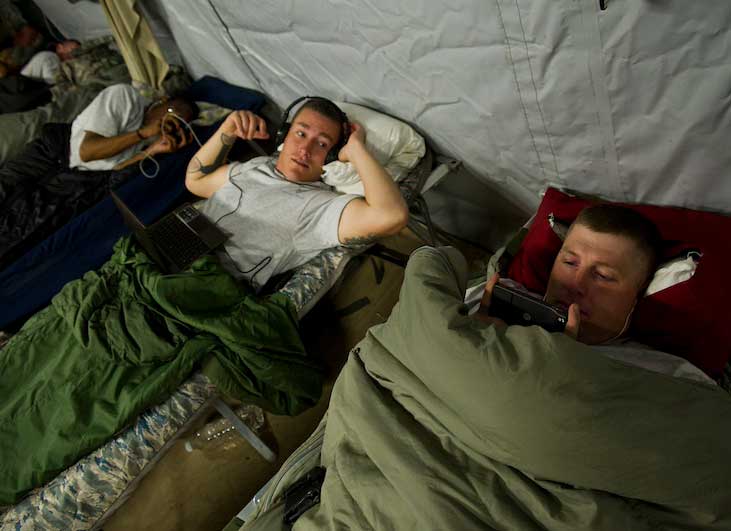Getting 7–9 hours of sleep every 24 hours is essential to human performance optimization and military readiness. But Service Members face many challenges in meeting their sleep requirements, especially during deployment. Warfighters need to navigate unpredictable schedules, night and sustained operations, and shared sleep environments. When roommates have different sleep schedules, it can be hard to create a dark and quiet environment to support good sleep. And lack of good sleep can lead to less effective communication during missions and conflict among teammates.
Learn how to optimize your sleep readiness while being considerate and respectful of your roommates' sleep needs.
Communicate clearly
Effective communication can help you and your roommates create a sleep-friendly environment in shared sleeping spaces.
- Check in with your peers: Create the habit of regularly checking in with your roommates about their upcoming operations and sleep schedules. Knowing each person’s plans can help you avoid potential sleep disturbances and ward off possible interpersonal conflict.
- Speak up: Take leadership in your room and tent and suggest everyone make a conscious effort to be respectful of each other’s needs. Encourage dialogue about sleep preferences and challenges, and validate differing points of view.
- Set clear rules and expectations: Work with your roommates to set clear rules and expectations for quiet hours and other considerations. Set the example and encourage your roommates to follow the rules and respect each other's need for rest.
Manage the environment
Controlling the level of noise and light in the environment can improve sleep quality and length.
Tips for you:
- Earplugs can minimize the impact of noise on your sleep. Invest in a high-quality model that’s comfortable for long-term use.
- Noise-canceling headphones are another option to reduce ambient noise.
- White noise machines create a consistent background sound that can mask disruptive noises and improve sleep quality and length.
- Eye masks block out light and can help you fall asleep faster and sleep better. They can also be particularly helpful when sleeping in areas where you can’t control the light.
- Blackout curtains can help block external light in rooms with windows.
Tips to support your roommates:
- Be mindful of the noise you make when others are trying to sleep. Move quietly and considerately—just as you’d like them to do for you.
- Use a flashlight instead of overhead lights to illuminate your personal space when your bunkmates are trying to sleep.
- Be aware of how much light comes from devices such as phones and laptops that might impact your roommates’ ability to sleep. Try to keep the light dimmed or pointed away from your teammates.
Build healthy sleep habits
While habits like having a consistent wake-up routine don't generally apply to deployment settings, controlling caffeine, nicotine, alcohol, and screen use can improve sleep quality and length. There are many specific sleep habits you can learn to sleep better during deployment.
Sharing rooms or tents with fellow Service Members can contribute to poor sleep during military missions. But you can optimize sleep readiness by paying attention to your own needs and your roommates' needs. Remember, sleep is essential to military health, wellness, and performance. Creating an environment that promotes sleep can improve military readiness.
